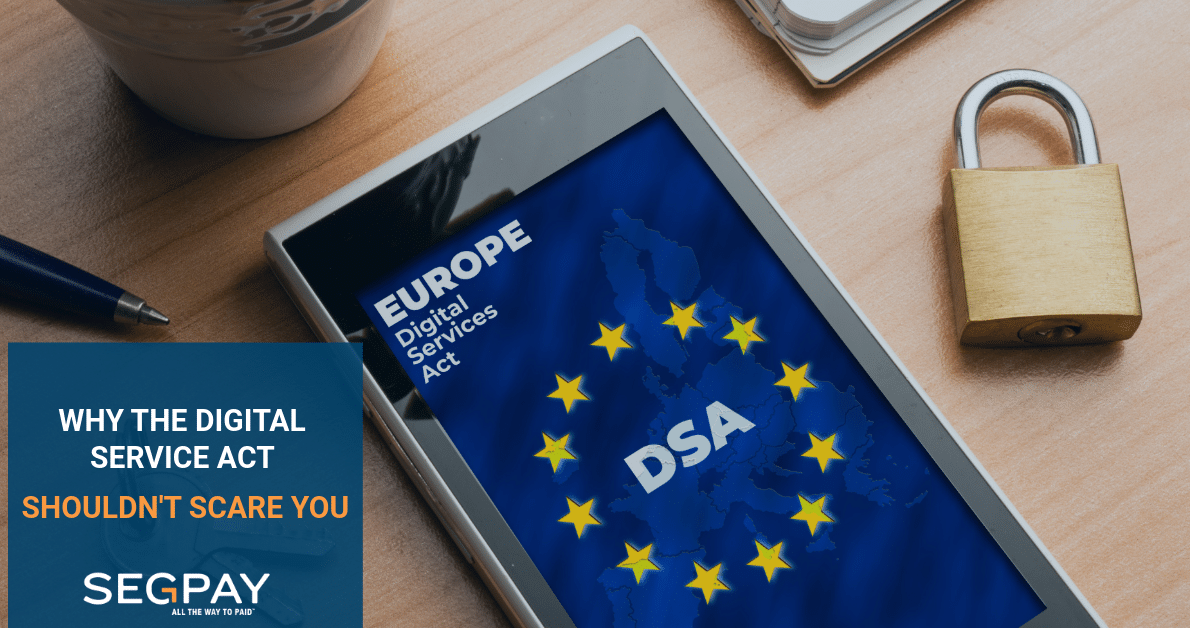- 5 minute read
You may hear the word regulation and get nervous, but you shouldn’t when it comes to the EU’s Digital Service Act (DSA). You can sigh relief if you comply with the most up-to-date card brand regulations. You’re likely doing many of the things required by DSA– already! Last month, online platforms were required to publish their number of active users to the European Commission as part of the Digital Services Act, but most platforms have been making changes to their system to comply with the act over the last six months. The regulation is designed to create a safe digital space, protect users’ rights, and level the playing field. It applies to all who do business in the European Union (EU), regardless of location. So, even if you live in the United States and do business in Europe, this applies to you. This essential set of online regulations is designed to bring safety through accountability. How does it work, and what does it mean for you? This month, we want to help merchants understand what this latest regulation means and if it impacts them.
What is the DSA?
The DSA is a newer set of rules designed to create a safer and more open digital space for users and businesses in the European Union. It covers various online services, including e-commerce platforms, marketplaces, social media networks, and online advertising providers. Under these rules, the digital platforms are held accountable for identifying and handling harmful or illegal content and services. Think of them as an extension of the recent Visa and Mastercard regulations, except on a more considerable regulatory level. The DSA, like card brand rules, applies to all online intermediaries or someone who offers a service that distributes information. This could be an e-commerce platform, marketplace, social media network, search engine, cloud service, messaging app, or online advertising service. It’s designed to ensure the highest level of protection for users’ rights online, like freedom of expression, privacy, data protection, and more. It also promotes a fair and transparent digital environment for businesses and consumers by establishing a clear set of rules and responsibilities for both companies and consumers. With the DSA, the EU is taking a significant step towards creating a more transparent and safer online environment for everyone.
Size Does Matter
How the DSA impacts you or your business depends on how extensive your customer reach is. The impact will be insignificant for most merchants in our industry. Most will need to comply with the general obligations of all companies doing business online in the EU. This includes establishing a legal representative in the EU, setting up an effective system for receiving and acting upon any illegal content or activity notices, informing users about their terms and conditions, cooperating with national authorities, ensuring data portability, and providing yearly transparency reports. Again, these are much like the things already being done for Visa and Mastercard. There are additional requirements based on your online platform’s reach. You will face one set of requirements if you reach about 45 million users or approximately 10% of the EU population. These include conducting risk assessments, implementing measures to mitigate systemic risks, appointing compliance officers, allowing external audits, and providing access to your data to researchers. You’ll also need to enable users to flag illegal or harmful content and offer an effective way to submit complaints. Each business user must ensure their business can be traced, and all codes of conduct must be followed.
If you reach more than 45 million users or over 10% of the EU population, which is rare in our industry, you’re considered a Very Large Online Platform (VLOP) and will face different rules. This includes cooperating with a European Board for digital services and notifying significant incidents to national authorities. They’ll need to be able to access all data as well. You’ll also need to prove you’re implementing measures to prevent illegal or harmful content and ensure transparency and accountability with any algorithms. All of this must be proven, along with human oversight over automated decision-making. Large companies like social media platforms such as Facebook or TikTok will face the same user-generated content rules we’ve all been adhering to.
Expanded Easier Reporting
The DSA was designed to improve the ability to remove illegal online content. It requires online platforms to communicate why any content is removed from users or access to an account is restricted. With the DSA, users can challenge decisions through an out-of-court dispute process. According to the European Commission, the DSA has launched a transparency database, the first of its kind, making content provider decisions accessible to the public. The DSA also claims to provide greater transparency and control over what we see on our feeds—for example, turning off personalized feeds on platforms such as TikTok, Facebook, or Instagram. DSA offers protection for minors through a zero tolerance of ads directed at children and teens. According to the new rules, online platforms accessible to underage minors should protect their privacy and security via settings that are on by default. Online verification can be put in place to help. These new regulations will also apply to the online marketplace as a protection against selling illegal goods. Online merchants must verify the information on their identity before selling anything.
So don’t fret when you see the new DSA regulation. It is just another step in making sure all content is compliant. The DSA is taking it to the next level, bringing compliance to a governmental level. The bottom line is if you are following all the rules, you should be fine.
Want to learn more about the DSA?
Contact us today, Reach out to us with your questions at [email protected]



